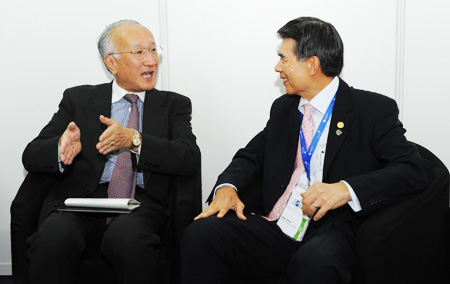
IEEJ's Nobuo Tanaka on left. (Picture credit: EMA)
Establishing collective energy security must be a priority among Asian nations, Nobuo Tanaka, Global Associate for Energy Security and Sustainability at Japan's Institute of Energy Economics, Japan (IEEJ), told delegates in his Opening Keynote at the inaugural Asia Future Energy Forum (AFEF) on Tuesday.
Tanaka, former Executive Director at the International Energy Agency and last year's Singapore Energy Lecture presenter, pointed to Europe's example as one from which Asia should learn.
He also highlighted the progress towards energy independence in North America--and the geopolitical impact this could have on countries such as Japan as the US' concern about protecting energy supplies through the Straits of Hormuz diminishes.
Japan relies on supplies passing through the Hormuz Straits for 85 percent of its oil and 20 percent of its gas. North America's energy independence aside, a more immediate concern for Japan would be any disruption to that source as IEA stockpiles cannot meet the shortfall for long.
Tanaka said lessons had been learnt from the Fukushima accidents--including the "human error" cited by a parliamentary investigation--and he believes nuclear power must play a significant role in Japan's energy future. "The loss of nuclear power means we need more of everything else; where will it come from" he said.
He said he was sceptical of the plan to phase out nuclear power in Japan by the 2030s. The solution, he said, was for Japan to be more diversified in its energy sources, including nuclear. There is more dependence on gas, but nuclear has a role if we can re-establish acceptance, he told the AFEF audience.
"The Japanese economy is agonising over how to recover from the impact of Fukushima," he said.
Tanaka compared Japan's--and Asia's--energy situation to that of Germany and Europe. Germany, he said, can phase out nuclear if it chooses because of its geographical position and the linkage of grid lines, which is a feature of Europe.
He pointed to Europe's "very well-balanced mix" of energy, citing many countries' reliance on coal, Sweden's hydropower, Italy's renewable and gas, and France and Belgium's continued nuclear power sourcing. "As a group of countries, they are achieving very strong collective sustainability," he commented.
Tanaka highlighted a number of important developments and considerations for Asia to move in the same direction. He cited Smart Grid as a key technology for Asia, Japan's Softbank's proposal for an Asian SuperGrid (which is ASEAN's gas pipeline system), the need for Japan to improve its gas pipeline system, and the potential for East Siberian gas fields to supply Asian needs.
In closing, he again emphasised the European Union (EU)'s model for collective energy security--a regional power grid interconnection and established gas pipelines. Tanaka also believes Fukushima "taught Japan to think about the unthinkable". He said it was now Japan's responsibility to share lessons learned for safer nuclear power deployment.
By :EMA staff, additional reporting by Tan Teck Hao